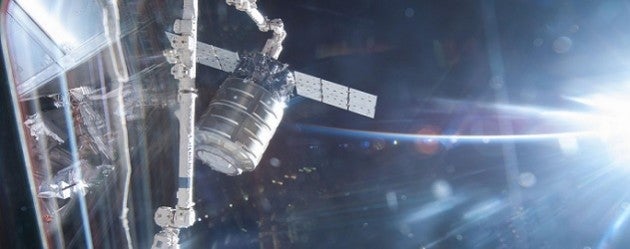Christmas arrives in space: ISS astronauts receive fresh fruit, 800 ants and 28 'doves'
The privately-launched Cygnus cargo ship delivered critical supplies as well as long-awaited gifts from the astronauts' families

Christmas has finally arrived in orbit, with a privately-launched resupply freighter delivering presents to the crew of the International Space Station (ISS) this weekend.
The delivery has been delayed repeatedly, first by cold weather in the US and the need to repair the ISS’s on-boarding cooling system, and most recently by the presence of a strong solar storm that could have disturbed the freighters’ navigation equipment.
The launch finally took place on 9 January, with the Orbital Sciences Corporation’s (OSC) Cygnus cargo ship successfully hooked and then berthed this weekend by the ISS’s robotic arm.
The mission was Orbital’s first carrying critical goods in a $1.9bn eight-flight contract with Nasa. The US space agency routinely employs private space flight companies to resupply the ISS after the retirement of its space shuttles in 2011.
Orbital delivered more than 1,360 kilograms of cargo including equipment, clothing, food and gifts from astronauts’ families. Some of the more welcome and unusual packages for the six-man ISS included crew a stash of fresh fruit, 800 ants and a flock of 28 Doves.
Whilst the ants are actual living creatures (they’ll be used in a series of science experiments studying the effects of microgravity), the Doves are in fact mini-satellites. They’re about the size of shoe-boxes and have been built by San Francisco startup Planet Labs.
The 28-strong ‘flock’ represent a new departure for satellite technology, which has previously relied on massive and extremely expensive craft.
The Doves will be an agile force, working in concert from a low orbit (310 miles up compared to the usual 500 mile height) to quickly deliver images to a range of clients. The company’s founders have said that their technology could be used for anything from tracking deforestation to helping target aid in disaster zones.
Whilst Planet Labs’ Doves will eventually be deployed in a new formation by the crew of the ISS, the Cygnus craft that ferried them into orbit will have a less productive fate. Once the astronauts have unloaded its cargo they will fill it with trash and fire back to Earth where it will disintegrate safely upon re-entry.
Subscribe to Independent Premium to bookmark this article
Want to bookmark your favourite articles and stories to read or reference later? Start your Independent Premium subscription today.

Join our commenting forum
Join thought-provoking conversations, follow other Independent readers and see their replies